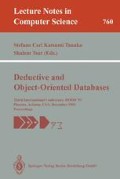Abstract
Deductive databases generalize relational databases by providing support for mecursive views and non-atomic data. Aditi is a deductive database system based on the client-server model: it is inherently multi-user and capable of exploiting parallelism on shared-memory multiprocessors. The back-end uses relational technology for efficiency in the management of disk based data and uses optimization algorithms especially developed for the bottom-up evaluation of logical queries involving recursion. The front-end interacts with the user in a logical language that has more expressive power than relational query languages. We present the structure of Aditi, discuss its components in some detail, and present performance figures.
Preview
Unable to display preview. Download preview PDF.
References
I. Balbin, G. Port, K. Ramamohanarao, and K. Meenakshi. Efficient. bottom-up computation of queries on stratified databases. Journal of Logic Programming, 11:295–345, 1991.
I. Balbin and K. Ramamohanarao. A generalization of the differential approach to recursive query evaluation. Journal of Logic Programming, 4(3):259–262, September 1987.
F. Bancilhon, D. Maier, Y. Sagiv, and J. Ullman. Magic sets and other strange ways to implement logic programs. In Proceedings of the Fifth Symposium on Principles of Database Systems, pages 1–15, Washington DC, 1986.
C. Beeri and R. Ramakrishnan. On the power of magic. In Proceedings of the Sixth ACM Symposium on Principles of Database Systems, pages 269–283, San Diego, California, March 1987.
J. Harland, D. B. Kemp, T. S. Leask, K. Ramamohanarao, J. A. Shepherd, Z. Somogyi, P. J. Stuckey, and J. Vaghani. Aditi-Prolog language manual. Technical Report 92/27, Department of Computer Science, University of Melbourne, Melbourne, Australia, November 1992.
J. Harland, D. B. Kemp, T. S. Leask, K. Ramamohanarao, J. A. Shepherd, Z. Somogyi, P. J. Stuckey, and J. Vaghani. Aditi users' guide. Technical Report 92/26, Department of Computer Science, University of Melbourne, Melbourne, Australia, November 1992.
J. Harland and K. Ramamohanarao. Constraint propagation for linear recursive rules. In Proceedings of the Tenth International Conference on Logic Programming, Budapest, Hungary, June 1993.
J. Harland and K. Ramamohanarao. Experiences with a flights database. Technical Report 92/28, Department of Computer Science, University of Melbourne, Melbourne, Australia, November 1992.
D. Kemp and P. Stuckey. Analysis based constraint query optimization. In Proceedings of the Tenth International Conference on Logic Programming, Budapest, Hungary, June 1993.
D. Kemp, P. Stuckey, and D. Srivastava. Query restricted bottom-up evaluation of normal logic programs. In Proceedings of the Joint International Conference and Symposium on Logic Programming, pages 288–302, Washington DC, November 1992.
D. B. Kemp, K. Ramamohanarao, I. Balbin, and K. Meenakshi. Propagating constraints in recursive deductive databases. In Proceedings of the First North American Conference on Logic Programming, pages 981–998, Cleveland, Ohio, October 1989.
D. B. Kemp, K. Ramamohanarao, and Z. Somogyi. Right-, left-, and multi-linear rule transformations that maintain context information. In Proceedings of the Sixteenth International Conference on Very Large Data Bases, pages 380–391, Brisbane, Australia, August 1990.
D. B. Kemp, P. J. Stuckey, and D. Srivastava. Magic sets and bottom-up evaluation of well-founded models. In Proceedings of the 1991 International Logic Programming Symposium, pages 337–351, San Diego, California, October 1991.
D. E. Knuth. Sorting and searching, volume 3 of The Art of Computer Programming, chapter 5.4.1. Addison-Wesley, Massachusetts, 1973.
T. S. Leask, K. Ramamohanarao, and P. J. Stuckey. Exploiting parallelism in bottom-up computation in Aditi. In Proceedings of the ILPS '91 Workshop on Deductive Databases, pages 72–81, San Diego, California, October 1991.
J. Linderman. Theory and practice in the construction of a working sort routine. Bell Laboratories Technical Journal, 63(8 (part 2)):1827–1843, October 1984.
K. Morris, J. F. Naughton, Y. Saraiya, J. D. Ullman, and A. V. Gelder. YAWN! (yet. another window on NAIL! IEEE Data Engineering, 10(4):28–43, December 1987.
M. Nakayama, M. Kitsuregawa, and M. Takagi. Hash-partitioned join method using dynamic destaging strategy. In Proceedings of the Fourteenth Conference on Very Large Data Bases, pages 468–477, Los Angeles, 1988.
G. Port, I. Balbin, and K. Ramamohanarao. A new approach to supplementary magic optimisation. In Proceedings of the First Far-East Workshop on Future Database Systems, pages 89–104, Melbourne, Australia, April 1990.
R. Ramakrishnan, D. Srivastava, and S. Sudarshan. Rule ordering in bottom-up fixpoint evaluation of logic programs. In Proceedings of the Sixteenth International Conference on Very Large Data Bases, pages 359–371, Brisbane, Australia, August 1990.
K. Ramamohanarao and J. Shepherd. A superimposed codeword indexing scheme for very large Prolog databases. In Proceedings of the Third International Conference on Logic Programming, pages 569–576, London, England, July 1986.
K. Ramamohanarao and J. Shepherd. Partial match retrieval for dynamic files using super-imposed codeword indexing. In E. Balagurusamy and B. Sushila, editors, Computer systems and applications: recent trends, pages 281–290. McGraw-Hill, New Delhi, India, November 1990.
K. Ramamohanarao, J. Shepherd, I. Balbin, G. Port, L. Naish, J. Thom, J. Zobel, and P. Dart. The NU-Prolog deductive database system. In P. Gray and R. Lucas, editors, Prolog and databases, pages 212–250. Ellis Horwood, Chicester, England, 1988.
D. Sacca and C. Zaniolo. Implementation of recursive queries for a data language based on pure horn logic. In Proceedings of the Fourth International Conference on Logic Programming, pages 104–135, Melbourne, Australia, May 1987.
J. Vaghani, K. Ramamohanarao, D. B. Kemp, Z. Somogyi, and P. J. Stuckey. Design overview of the Aditi deductive database system. In Proceedings of the Seventh International Conference on Data Engineering, pages 240–247, April 1991.
Author information
Authors and Affiliations
Editor information
Rights and permissions
Copyright information
© 1993 Springer-Verlag Berlin Heidelberg
About this paper
Cite this paper
Ramamohanarao, K. (1993). An implementation overview of the Aditi deductive database system. In: Ceri, S., Tanaka, K., Tsur, S. (eds) Deductive and Object-Oriented Databases. DOOD 1993. Lecture Notes in Computer Science, vol 760. Springer, Berlin, Heidelberg. https://doi.org/10.1007/3-540-57530-8_12
Download citation
DOI: https://doi.org/10.1007/3-540-57530-8_12
Published:
Publisher Name: Springer, Berlin, Heidelberg
Print ISBN: 978-3-540-57530-6
Online ISBN: 978-3-540-48212-3
eBook Packages: Springer Book Archive

